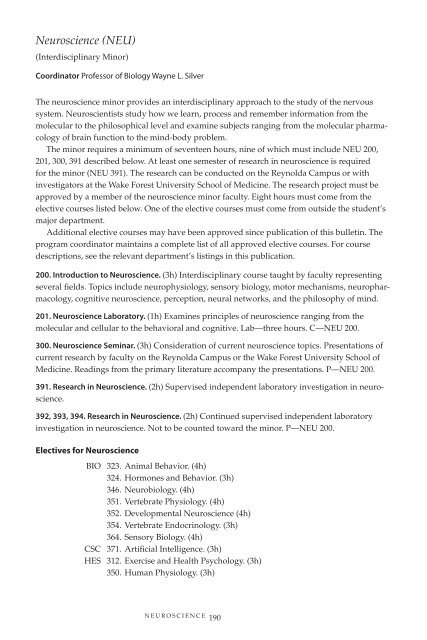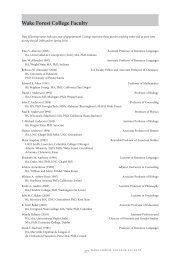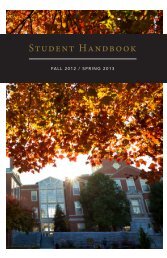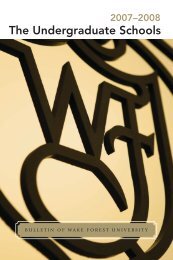- Page 1 and 2:
The Undergraduate Schools 2006-2007
- Page 3 and 4:
1 New Series June 2006 Volume 101,
- Page 5 and 6:
T A B L E O F C O N T E N T S 3 Tab
- Page 7 and 8:
German Studies ....................
- Page 9 and 10:
Wake Forest honors its Baptist heri
- Page 11 and 12:
and offer the ability to interact w
- Page 13 and 14:
Facilities in the Z. Smith Reynolds
- Page 15 and 16:
WAKE FOREST COLLEGE IS THE UNDERGRA
- Page 17 and 18:
Council, and the Judicial Council.
- Page 19 and 20:
Academic Affairs which will study t
- Page 21 and 22:
ALL STUDENTS ARE RESPONSIBLE FOR FA
- Page 23 and 24:
college credit through the subject
- Page 25 and 26:
and Accountancy for full-time resid
- Page 27 and 28:
their visitors. Students will be he
- Page 29 and 30:
(by weeks) of room, meal, transport
- Page 31 and 32:
or other assistance. The adviser su
- Page 33 and 34:
shorter durations, such as four, fi
- Page 35 and 36:
of an honor violation. Students see
- Page 37 and 38:
colleges and universities, includin
- Page 39 and 40:
Complete the requirements for a bac
- Page 41 and 42:
The Presidential Scholarship for Di
- Page 43 and 44:
The Heritage Scholarship is awarded
- Page 45 and 46:
The H. Grady Britt Scholarship assi
- Page 47 and 48:
The Ernst & Young International Sch
- Page 49 and 50:
The Stanton B. Ingram Scholarship a
- Page 51 and 52:
The Gail Sawyer Moore Scholarship,
- Page 53 and 54:
The Mark Schurmeier 9/11 Peace Fund
- Page 55 and 56:
The Howard C. Vaughan Scholarship,
- Page 57 and 58:
study each or two students for two
- Page 59 and 60:
STUDENTS IN THE COLLEGE ARE ENCOURA
- Page 61 and 62:
Cuba (Havana) Students interested i
- Page 63 and 64:
Degrees Off ered The College offers
- Page 65 and 66:
Foreign Language Placement All stud
- Page 67 and 68:
work to remove the NR.) Removal of
- Page 69 and 70:
Senior Testing All seniors may be r
- Page 71 and 72:
Courses of Instruction PLANS OF STU
- Page 73 and 74:
Electives for American Ethnic Studi
- Page 75 and 76:
150. Introduction to Linguistics. (
- Page 77 and 78:
361. Evolution of Human Behavior. (
- Page 79 and 80:
The required art history courses in
- Page 81 and 82:
273. Rococo to Revolution: The Art
- Page 83 and 84:
213. Painting III. (3h) Individuali
- Page 85 and 86:
B I O L O G Y 83 Biology (BIO) Chai
- Page 87 and 88:
307. Biophysics. (3h) Introduction
- Page 89 and 90:
346. Neurobiology. (4h) Introductio
- Page 91 and 92:
pathways. Labs emphasize approaches
- Page 93 and 94:
The bachelor of arts degree in chem
- Page 95 and 96:
301, 302. Elective Research. (0h, 0
- Page 97 and 98:
Highly qualified majors are invited
- Page 99 and 100:
Classics 151. Ethics in Greece and
- Page 101 and 102:
100. Introduction to Communication
- Page 103 and 104:
305. Communication and Ethics. (3h)
- Page 105 and 106:
C O M P U T E R S C I E N C E 103 C
- Page 107 and 108:
333. Principles of Compiler Design.
- Page 109 and 110:
ANT (cont.) 378. Conservation Arche
- Page 111 and 112:
The department offers minors in Chi
- Page 113 and 114:
175. Japanese Culture: Insight and
- Page 115 and 116:
311. Special Topics in East Asian S
- Page 117 and 118:
150. Introduction to Economics. (3h
- Page 119 and 120:
268. Morals and Markets. (3h) Histo
- Page 121 and 122:
Students may not take courses outsi
- Page 123 and 124:
274. Environmental Geography. (3h)
- Page 125 and 126:
393. Individual Study. (1h, 3h) A p
- Page 127 and 128:
160. Introduction to British Litera
- Page 129 and 130:
320. British Drama to 1642. (3h) Br
- Page 131 and 132:
374. American Fiction before 1865.
- Page 133 and 134:
Required Courses for Entrepreneursh
- Page 135 and 136:
216. Leading in the Nonprofit Secto
- Page 137 and 138:
Interdisciplinary Minor in Environm
- Page 139 and 140:
COM (cont.) 310. Advanced Media Pro
- Page 141 and 142: 283. German Literature from Poetic
- Page 143 and 144: 270. Individual Study. (1.5-3h) Stu
- Page 145 and 146: GER 229. German for Business and Ec
- Page 147 and 148: 350. Human Physiology. (3h) Lecture
- Page 149 and 150: Health Policy and Administration (H
- Page 151 and 152: and earn an overall grade point ave
- Page 153 and 154: 245. Modern China. (3h) Study of Ch
- Page 155 and 156: 351. United States Social History I
- Page 157 and 158: H U M A N I T I E S 155 Humanities
- Page 159 and 160: 252. Introduction to Chinese Film.
- Page 161 and 162: 381. Independent Research in Asian
- Page 163 and 164: 265. Humanity and Nature. (3h) Mult
- Page 165 and 166: Global Thematic Studies Two courses
- Page 167 and 168: JPN 350. Japanese Modern Literature
- Page 169 and 170: I T A L I A N S T U D I E S 167 Ita
- Page 171 and 172: 275. Introduction to Mass Communica
- Page 173 and 174: Electives for Latin-American Studie
- Page 175 and 176: 375. Philosophy of Language. (3h) S
- Page 177 and 178: courses which build upon the regula
- Page 179 and 180: 256. Statistical Methods. (3h) Stud
- Page 181 and 182: M E D I E VA L S T U D I E S 179 Me
- Page 183 and 184: M I L I T A R Y S C I E N C E 181 M
- Page 185 and 186: M U S I C 183 Music (MUS) Chair Dav
- Page 187 and 188: 171. Music Theory I. (4h) Music fun
- Page 189 and 190: Ensemble Departmental ensembles are
- Page 191: 165v. Class Voice I. (0.5h) Introdu
- Page 195 and 196: 352. Hegel, Kierkegaard, and Nietzs
- Page 197 and 198: The bachelor of arts degree require
- Page 199 and 200: 320. The Physics of Macromolecules.
- Page 201 and 202: average. In addition, the candidate
- Page 203 and 204: 233. The Politics of Modern Germany
- Page 205 and 206: 264. Moral Dilemmas in Internationa
- Page 207 and 208: P S Y C H O L O G Y 205 Psychology
- Page 209 and 210: 280. Directed Study. (1-3h) Student
- Page 211 and 212: R E L I G I O N 209 Religion (REL)
- Page 213 and 214: 302. Mysticism. (3h) Study of mysti
- Page 215 and 216: 347. The Emerging Church in the Two
- Page 217 and 218: 386. The Indian Epics in Performanc
- Page 219 and 220: The major in Spanish requires a min
- Page 221 and 222: 196. French Across the Curriculum.
- Page 223 and 224: Semester in France The department s
- Page 225 and 226: Tornatore, Massimo Troisi, Roberto
- Page 227 and 228: structure, and expository usage app
- Page 229 and 230: 353. Indigenous Myth in Spanish-Ame
- Page 231 and 232: 390. Directed Reading. (1.5h) Requi
- Page 233 and 234: EDU 3739. Comparative and Internati
- Page 235 and 236: 301. Sociology of Religion. (3h) In
- Page 237 and 238: 361. Sociology of the Black Experie
- Page 239 and 240: No more than three hours of THE 294
- Page 241 and 242: 255. History of Costume. (3h) Surve
- Page 243 and 244:
Senior Dance Project - DCE 200 (1-1
- Page 245 and 246:
Students intending to minor in urba
- Page 247 and 248:
Electives for Women’s and Gender
- Page 249 and 250:
Wayne Calloway School of Business a
- Page 251 and 252:
program complementary to the School
- Page 253 and 254:
major are: MTH 253, 256, 301 (or 11
- Page 255 and 256:
213. Entrepreneurship. (3h) Exposes
- Page 257 and 258:
ationale for various structured pro
- Page 259 and 260:
techniques can be brought to bear o
- Page 261 and 262:
All Schools—Fall 2005 E N R O L L
- Page 263 and 264:
Officers - 2005-2006 L. Glenn Orr J
- Page 265 and 266:
Years following name indicate year
- Page 267 and 268:
Babcock Graduate School of Manageme
- Page 269 and 270:
Norman H. Potter, Jr. (2005, 2005)
- Page 271 and 272:
Barbara Walker (1999, 1999) Senior
- Page 273 and 274:
Legal Department J. Reid Morgan (19
- Page 275 and 276:
University Advancement Sandra Combs
- Page 277 and 278:
Other Administrative Offices C. Kev
- Page 279 and 280:
Victor Apanius Adjunct Assistant Pr
- Page 281 and 282:
Frank Bradley (2005) Adjunct Assist
- Page 283 and 284:
William E. Conner (1988) Professor
- Page 285 and 286:
Rushad Faridi (2004) Visiting Assis
- Page 287 and 288:
Vona Groarke (2005) Visiting Poet-i
- Page 289 and 290:
Nathan Howard (2005) Visiting Assis
- Page 291 and 292:
Lee G. Knight (1979, 2000) Hylton P
- Page 293 and 294:
Nina Maria Lucas (1996) Associate P
- Page 295 and 296:
William M. Moss (1971) Professor of
- Page 297 and 298:
Stephen B. Robinson (1991) Professo
- Page 299 and 300:
Margaret Supplee Smith (1979) Harol
- Page 301 and 302:
Timothy K. Wagner (2006) Adjunct As
- Page 303 and 304:
Dates following names indicate peri
- Page 305 and 306:
Carl V. Harris (1956-1989) Professo
- Page 307 and 308:
Thomas C. Taylor (1971-2003) Profes
- Page 309 and 310:
The Committee on Library Planning.
- Page 311 and 312:
A About this Bulletin 314 Academic
- Page 313 and 314:
Global Trade and Commerce Studies 1
- Page 315 and 316:
P Part-time Students 29 Pass/Fail 3
- Page 317 and 318:
THE UNDERGRADUATE BULLETIN IS PUBLI
- Page 319 and 320:
N O T E S 317 Notes _______________
- Page 321 and 322:
N O T E S 319 Notes _______________
- Page 323:
Director of Admissions Post Office






